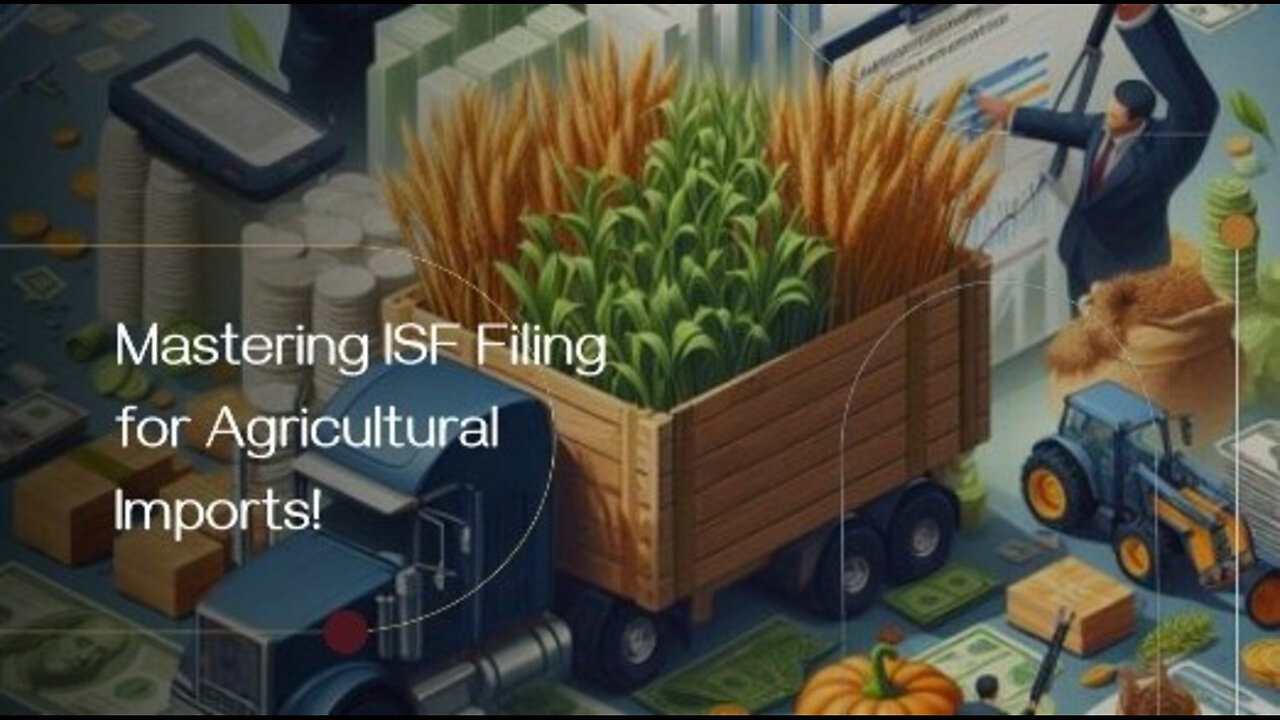Premium Only Content

Navigating Customs: Filing an ISF for an Agricultural Product Processing Line
License To Import // 323-578-6432 // [email protected] // www.licensetoimport.com
In this response, we discuss the process of filing an Importer Security Filing (ISF) for an agricultural product processing line. We provide an overview of what an ISF is, the importance of understanding the product being imported and determining the correct HTS code, as well as gathering essential information for the filing. We emphasize the timeliness of submitting the ISF and highlight the role of customs brokers in ensuring compliance with customs regulations. Additionally, we touch upon the significance of customs bonds in the importation process and the role of customs brokers in facilitating smooth trade operations. By following these steps and understanding the involvement of customs brokers, importers can navigate the complexities of international trade more effectively.
#usimportbond #isfcustomsbroker #uscustomsclearing #isfentry
Video Disclaimer Here: This video is solely for education and is not endorsed by any US government agency.
00:25 - Understanding ISF and Importance: The Importer Security Filing (ISF), or 10+2, is a mandatory filing by U.S. Customs for ocean shipments, requiring detailed information about the imported agricultural products to ensure compliance with regulations.
01:19 - Key Steps for Filing: When filing an ISF for agricultural imports, it is essential to accurately identify the product, determine its Harmonized Tariff Schedule (HTS) code, gather required shipment details, and submit the filing at least 24 hours before cargo loading to avoid penalties.
02:49 - Role of Customs Brokers and Bonds: Customs brokers assist in navigating the ISF filing process, ensuring compliance and minimizing risks. Additionally, obtaining a customs bond is crucial for financial compliance concerning duties and taxes in the importation process.
-
 1:46
1:46
License To Import
1 month agoHow To File ISF For Plastic Rotational Molding Machine
34 -
 LIVE
LIVE
Winston Marshall
19 minutes agoThe Dangerous Fracturing on the American Right Over Israel
144 watching -
 DVR
DVR
Stephen Gardner
58 minutes agoBREAKING LEAK: Trump Prepping Huge White House Shake-Up!
2.34K5 -
 1:29:42
1:29:42
The Quartering
2 hours agoTrumps Turkey Pardon Roast, Woke Pastor Destroyed, AI To Replace 40% Of Workers & More
86.4K10 -
 1:08:32
1:08:32
DeVory Darkins
3 hours agoBREAKING: Minnesota Judge Makes FATAL MISTAKE Overturning Jury’s $7.2M Somali Fraud Verdict
104K74 -
 7:40
7:40
Colion Noir
1 hour agoArmed 7-Eleven Clerk Shoots Attacker & Gets Fired
6.26K19 -
 2:07:24
2:07:24
Side Scrollers Podcast
4 hours agoAsmongold/DSP RESPONSE + Kaceytron’s Life IMPLODES + Lunduke Gets Threats + More | Side Scrollers
94.4K4 -
 2:22:52
2:22:52
Steven Crowder
6 hours agoDonald Vs. Ilhan: Trump Boots Somalis and The Meltdown is Glorious
463K330 -
 1:04:37
1:04:37
Sean Unpaved
4 hours agoIs Lane Kiffin Staying At Ole Miss Or LEAVING For LSU? | UNPAVED
19.5K -
 29:48
29:48
The White House
4 hours agoPresident Trump and The First Lady Participate in the Thanksgiving Turkey Pardoning
37.4K23